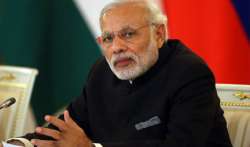‘There should be zero tolerance for corruption and black money’: PM Modi at G20 Summit
Prime Minister Narendra Modi on Monday raised the issue of black money and tax evasion at the ongoing G20 Summit here and asked the member countries to take action against the financial corruption.

Prime Minister Narendra Modi on Monday raised the issue of black money and tax evasion at the ongoing G20 Summit here and asked the member countries to take action against the financial corruption.
On the second day of the Summit, Modi said "fighting corruption, black money and tax evasion were central to effective financial governance."
The Prime Minister also said there should be "zero tolerance" for corruption and black money and treaty loopholes.
He urged the members nations to show "full commitment" to action against the financial corruption.
Eliminate ‘safe havens’ for economic offenders
During the Summit, PM Modi also urged for elimination of “safe havens” for economic offenders as he called on G20 members to break down the web of excessive banking secrecy.
“We need to act to eliminate safe havens for economic offenders, track down and unconditionally extradite money launderers and break down the web of complex international regulations and excessive banking secrecy that hide the corrupt and their deeds,” he said.
The prime minister said that a stable global economic and financial system is imperative for growth as it promotes inclusive and sustainable growth.
He called for further strengthening of the global financial safety net.
“We need a regular dialogue between the IMF, Regional Financial Arrangements and Bilateral Swap Arrangements.
Important mechanisms like financial stability board should stick to their core mandate,” External Affairs Ministry spokesperson Vikas Swarup quoted the Prime Minister as saying in a series of tweets.
“IMF should remain a quota-based institution and not depend on borrowed resources,” Modi said emphasing that the “long-delayed 15th General Review of Quotas must be completed by 2017 Annual Meetings.”
(With inputs from agencies)